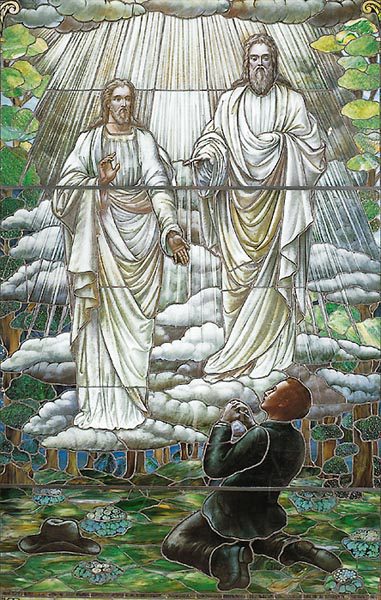
I’ve been slowly reading through Hyrum L. Andrus and Helen Mae Andrus, eds., Personal Glimpses of the Prophet Joseph Smith (American Fork UT: Covenant Communications, 2009). The book is, I presume, an at least slightly revised version of a much earlier volume (called, if I’m not mistaken, They Knew the Prophet) that the late Brother and Sister Andrus had published years before, and that I had already read.
I’ve extracted and posted a number of quotations from the book, because I found them interesting.
Late Sunday night or early Monday, I posted an 1894 autobiographical account by Edward Stevenson of a meeting that he had attended in 1834 (or thereabouts) and in which he had, he said, heard Joseph Smith bear his testimony of the appearance of the Father and the Son in the First Vision:
“A reminiscence of an 1834 retelling of the First Vision story by Joseph Smith”
I supplied both the date 1834 and the date 1894 and I expected that my readers would be able to do the math, and to see thereby that Elder Stevenson’s reminscence was published sixty years — that’s six decades, in case anybody is unclear on the issue — after the event.
I thought the reminiscence interesting or, in my actual words, “worth noting,” because (among other things) of issues that have been raised about Joseph’s claims of a “First Vision”:
It’s sometimes alleged by critics that Joseph Smith came up with the idea of a visit of two personages — the Father and the Son — rather late (say, in the 1838 “canonical” version now known as JS-History 1) and/or that he began to soup the story up from a mere vision of angels during, say, the collapse of the Kirtland Panic in the national Panic of 1837 (so as to shore up his personal prestige and authority). In the light of such charges, I think this 1894 autobiographical account from Edward Stevenson worth noting.
Please notice that I did not say that Elder Stevenson’s account proved such allegations wrong beyond a shadow of doubt. I did not say that a reminiscence in old age of an event from sixty years earlier constituted the strongest possible evidence. (The slightly cumbersome title of my post — “A reminiscence of an 1834 retelling of the First Vision story by Joseph Smith” — was deliberately if only implicitly rather modest. As is the title of this post itself.) I said, simply, that the account was “worth noting.”
My actual view is that the Stevenson account deserves to be stirred into the mix of documentation that we possess regarding Joseph Smith’s First Vision, but certainly not that it’s a primary-source document of pivotal importance. There are no decisive historical documents here that will absolutely settle the issue once and for all in the eyes of all parties. This certainly isn’t such a decisive document. Frankly, it had never occurred to me that anybody would think otherwise. Believers (like myself) will believe. Unbelievers won’t believe.
Several people here pointed out that it was a late account, something that I readily grant. One or two wrote that it could not possibly be true, a sweeping declaration that I think far too strong and quite unjustified by the historical data. Elsewhere, responses were occasionally stronger, much more harsh. My posting of the quotation, according to several posters at one particularly dark place, proves my mendacity. (Of course, that’s a site where, if it were reported that I’d drawn breath upon waking up in the morning, that would demonstrate my dishonesty.)
And when, replying to a critic here on this blog, I explained what I thought entirely obvious, that “I didn’t offer it as proof. I simply thought it interesting. There’s been considerable hyperventilating about it in a couple of places on line, as if I had offered it as — and declared it — a slam dunk,” that comment was cited as proof that, under the pressure of righteous indignation and powerful historical arguments, I’m now backing away from my “lie.”
In the following little playlet, “The Deceiver” represents me, while “Veritas” represents all those who recognize my depraved indifference to Truth and Goodness. Here’s how the routine goes:
The Deceiver: “Here’s a late reminiscence worth noting, particularly in the light of Claim X.”
Veritas: “The Deceiver is claiming that this account refutes Claim X! What a liar!”
The Deceiver: “I never actually said that this account refutes Claim X. I said ‘Here’s a late reminiscence worth noting, particularly in the light of Claim X.'”
Veritas: “Hah! See? The Deceiver is backing away from his claim that this account refutes Claim X! What a liar!”
Posted from Newport Beach, California











